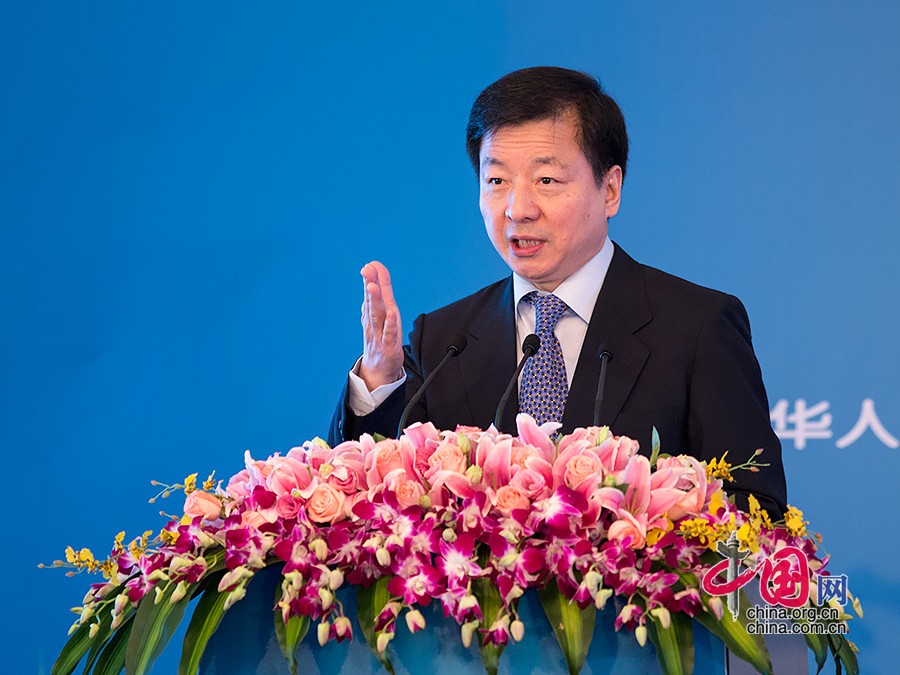Speech by Zhou Mingwei
 0 Comment(s)
0 Comment(s) Print
Print E-mail China.org.cn, February 9, 2015
E-mail China.org.cn, February 9, 2015
|
|
|
Zhou Mingwei, president of China International Publishing Group, delivers a speech at the opening ceremony of the International Seminar on the 21st-Century Maritime Silk Road Initiative in Quanzhou City, Fujian Province, on Feb. 11, 2015. [Photo:China.org.cn] |
The following is the full text of Zhou Mingwei's speech titled "Enhancing the Sense of Shared Community and Collectively Building the 21st-Century Maritime Silk Road. "
Your Excellency You Quan, Secretary of the Provincial CPC Committee of Fujian,
Your Excellency Jiang Jianguo, Minister of the State Council Information Office,
Your Excellency Cai Mingzhao, President of Xinhua News Agency,
Your Excellency Wang Weiguang, President of the Chinese Academy of Social Sciences,
Distinguished guests, ladies and gentlemen,
First of all, please allow me, on behalf of the seminar's organizer CIPG, to extend a warm welcome to distinguished guests from all over the world.
As an important hub along the ancient Maritime Silk Road, the city of Quanzhou in Fujian Province facilitated a wealth of friendly communication between peoples from around the world and left precious historical legacy and spiritual wealth. Today, it is important for us to gather here to look forward towards the future of the 21st-Century Maritime Silk Road.
The initiative to together build the 21st-Century Maritime Silk Road evidences the strong determination of China's new leadership led by Chinese President Xi Jinping to adhere to the road of peaceful development, demonstrates China's faith in pursuing principles of amity, sincerity, mutual benefits and inclusive diplomacy with neighboring countries and expresses the country's aspirations for common development and progress alongside the international community.
We now live in a "global village" that is becoming smaller and smaller. With the rapid development and application of new technologies represented by information technology and the constant optimization and adjustment of economic structure and development modes, a "new normal" era has emerged, in which people from different countries are better interconnected and interdependent on each other in both depth and breadth. In this context, we face increasingly similar problems and challenges and find greater common ground. One purpose of the seminar is to intensify the sense of shared community and expand common ground through deepening mutual understanding.
First, we need to jointly build awareness of the creation of a community of shared interests. In the 21st Century, the world's economic center of gravity has shifted towards the Asia-Pacific region at a faster pace, and a new era of priority on maritime cooperation and development has emerged. Areas along the 21st-Century Maritime Silk Road are considered some of the regions with the greatest vitality and potential. Despite their different social systems, development levels, cultural traditions, and religious beliefs, all countries in the region share a common goal of seeking economic growth, maintaining social stability, and improving standards of living. Moreover, they complement each other in many aspects. Thus, deepening bilateral and multilateral cooperation serves the common interests of all parties involved. As Fraser Cameron, director of the EU-Asia Center, noted in his papers, the 21st-Century Maritime Silk Road will effectively accelerate the trade development of China and even the entire Eurasian Continent once it is completed.
Second, we need to jointly intensify awareness of the creation of a community of common destiny. In the context of deepening economic globalization, it has become an increasing trend for countries along the Maritime Silk Road to recognize and understand their intertwined interests, share ups and downs, and stand together in peril or safety. No country is immune from emerging problems and difficulties. Building the 21st-Century Maritime Silk Road can help tap the potential of all parties involved, enable them to complement each other, converge their respective interests, and integrate the most outstanding genes of different civilizations to maintain stability of the regional political environment and promote regional economic cooperation. In addition, the 21st-Century Maritime Silk Road Initiative will encourage countries in the region to become a community with shared destiny. As Yong Chanthalangsy, director general of the Laos Institute of Foreign Affairs, mentioned in his papers, the world has never been connected as closely as it is today, and Asian countries have never been so eager to seek win-win cooperation, maintain regional peace and stability and promote regional development and cooperation.
Third, we need to jointly build awareness of the creation of a community of shared responsibility. It should be expected that various parties will think differently based on their respective interests and will encounter many unexpected problems in the course of seeking economic and social development and cooperation. Both the traditional wisdom of Eurasian people and our recent experience in the context of economic globalization show that we should pool our ideas and join hands to overcome the challenges that we face. This means that we should share development opportunities while defusing threats and bearing responsibilities together. Different in the depth and ways of participation, different countries will assume different responsibilities. A Chinese saying goes: "In poverty, one should sustain oneself; in prosperity, one should help others out." As the founder of the 21st-Century Maritime Silk Road Initiative, China will treat all countries along the Road with sincerity, maintain honesty in word and resoluteness in deed, and shoulder its own share of responsibility.





Go to Forum >>0 Comment(s)